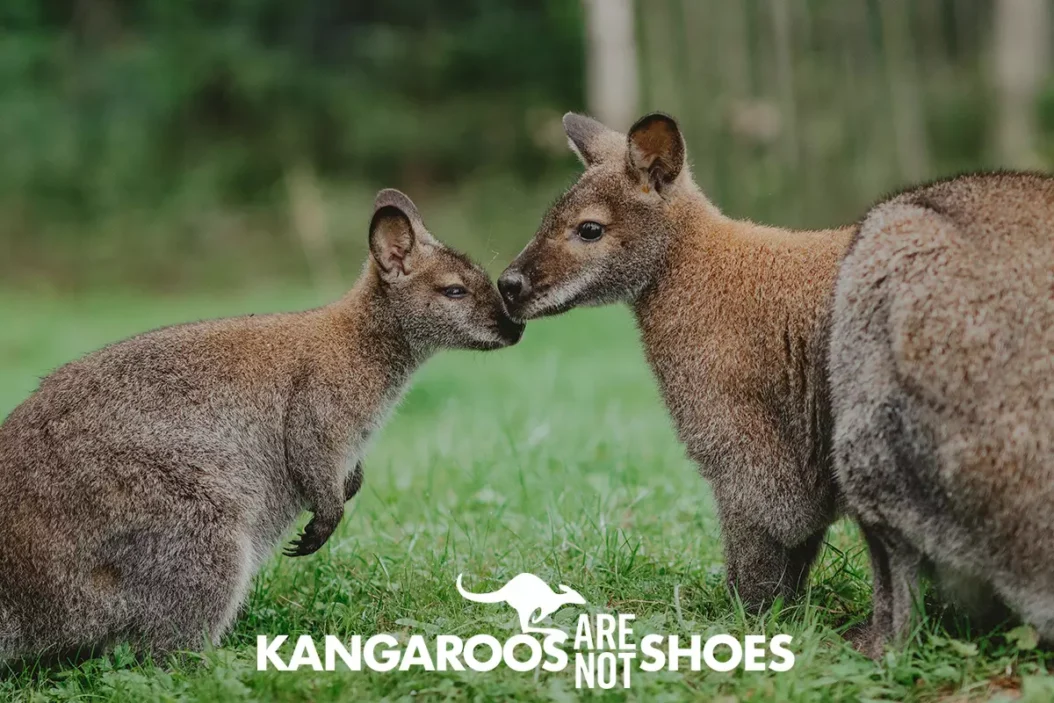Senators weigh in to stop the largest annual slaughter of terrestrial wildlife in the world
WASHINGTON, D.C. – U.S. Sens. Tammy Duckworth, D-Ill., and Cory Booker, D-N.J. introduced legislation today to cut off the U.S. marketplace to the parts of kangaroos, who are commercially slaughtered in their native habitats for export, mainly to make athletic shoes. The Kangaroo Protection Act of 2024, which is a companion to H.R. 4995, would prohibit importation of kangaroos and kangaroo products into the United States for commercial purposes with intent to profit, punishable with a $10,000 fine, year in prison or both.
The Center for a Humane Economy and Animal Wellness Action, which are running a global “Kangaroos Are Not Shoes” campaign, applauded the senators for their work to protect wildlife from commercial trade, conducted in a barbaric manner. The Center for a Humane Economy called out Adidas as a massive contributor to kangaroo killing, given the volume of skins needed just to make a small set of soccer shoe models. Last year, the Center for a Humane Economy secured commitments from Nike, Puma, and New Balance to stop their sourcing of kangaroo skins for soccer cleats. Earlier this year, the U.K.-based Sokito halted sales.

“Commercial shooters slay perhaps 1.5 million kangaroos a year in their native habitats for use in uppers in soccer cleats and other products that can be made with other fabrics that perform just as well and that require no violence to procure,” said Wayne Pacelle, president and CEO of Animal Wellness Action and the Center for a Humane Economy. “If the legislation from Senators Duckworth and Booker is enacted, the Kangaroo Protection Act will prevent the mass orphaning of joeys whose mothers are killed in merciless and indiscriminate nighttime shoots.”
“The mass killing of millions of kangaroos to make commercial products is needless and inhumane—and we must do better,” said Sen. Duckworth. “I’m proud to introduce this bill with Senator Booker that would help prevent the deadly exploitation of kangaroos and promote the use of more humane alternatives to k-leather.”
“We must take action to conserve the kangaroo species and end their inhumane exploitation,” said Sen. Booker. “This legislation will ensure that no one in the United States can distribute kangaroo products for commercial benefits.”
Copy of the bill text is available on Senator Duckworth’s website
The Senate bill is a companion bill, H.R. 4995, introduced by Reps. Brian Fitzpatrick, R-Pa., and Jan Schakowsky, D-Ill. More than 200 organizations have endorsed the legislation, and it has broad support in Australia. California bans any sale of kangaroo parts, and it is the largest soccer market in the United States.
Emma Hurst, a Member of the Australian Parliament, lobbied Congress earlier in the year to take action on the issue and protect animals who are the emblem of Australia. “The U.S. stood up and fought to protect koalas by enacting a law to no longer accept imports of koala body parts,” said Hurst. “At the time it may have saved the species from going extinct. I thank the brave politicians in the U.S. now doing the same to protect kangaroos and ensuring this brutal industry comes to an end.”
Animal welfare charity, SPCA International, is partnered with Animal Wellness Action (AWA) and the Center for a Humane Economy (CHE) in its Kangaroos Are Not Shoes (KANS) campaign. “The passage of the Kangaroo Protection Act is critical in safeguarding these animals from inhumane treatment and exploitation. By cutting off imports, we can significantly reduce the demand that drives the commercial killing of kangaroos, ensuring their survival and promoting more ethical and sustainable practices,” said Lori Kalef, Director of Programs for the organization. “This bill is crucial in protecting kangaroos and preserving Australia’s wildlife for future generations.”
In 2020, approximately 1.7 million kangaroos were killed annually in a commercial slaughter for their parts, a number that didn’t include up to half a million joeys bludgeoned or orphaned in the process. Since the start of CHE’s KANS campaign, the number of adult kangaroos directly killed has dropped to around 1 million, according to government statistics. There may be an additional 300,000 joeys orphaned after their mothers are shot.
The drop in demand may be explained by the successes of the Kangaroos Are Not Shoes campaign in drawing attention to major companies quietly sourcing skins taken from kangaroos slain in their habitats. Joining Nike, Puma, Diadora, New Balance, the U.K.-based Sokito announced it is halting its use of kangaroo skins in 2024, opting out of participation in the inhumane kill of the Australian marsupials and switching to ethically and sustainably sourced materials.
In May, at the Adidas annual general meeting in Herzogenaurach, Germany, company CEO Bjorn Gulden responded to shareholder’s question about the continued use of kangaroo skin with, “We will certainly, maybe, switch faster than you think.” Still, Adidas continues to sell soccer shoes made from kangaroo, and, for decades, has been the biggest brand-name apologist of kangaroo slaughter.

